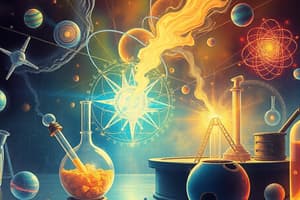Podcast
Questions and Answers
What is the name for a testable explanation for a phenomenon?
What is the name for a testable explanation for a phenomenon?
- Data
- Law
- Hypothesis (correct)
- Theory
Scientific knowledge never changes once it is discovered.
Scientific knowledge never changes once it is discovered.
False (B)
What is the basic unit of life in biology?
What is the basic unit of life in biology?
Cell
The application of scientific knowledge for practical purposes is known as __________.
The application of scientific knowledge for practical purposes is known as __________.
Which branch of science deals with the Earth's structure, composition, and history?
Which branch of science deals with the Earth's structure, composition, and history?
Physics is the science that deals with living organisms.
Physics is the science that deals with living organisms.
What is anything that has mass and takes up space called?
What is anything that has mass and takes up space called?
__________ studies the interactions between organisms and their environment.
__________ studies the interactions between organisms and their environment.
Which of these is NOT a major branch of physics?
Which of these is NOT a major branch of physics?
Atoms are the basic building blocks of matter.
Atoms are the basic building blocks of matter.
What molecule carries genetic information in living organisms?
What molecule carries genetic information in living organisms?
The periodic table organizes elements based on their atomic number and __________ properties.
The periodic table organizes elements based on their atomic number and __________ properties.
Which of the following best describes the scientific method?
Which of the following best describes the scientific method?
A theory in science is just a guess.
A theory in science is just a guess.
What is the study of the Earth's atmosphere and weather called?
What is the study of the Earth's atmosphere and weather called?
__________ bonds involve the sharing of electrons between atoms.
__________ bonds involve the sharing of electrons between atoms.
Which of these sciences studies plants?
Which of these sciences studies plants?
Oceanography studies the origin, evolution, and structure of the universe.
Oceanography studies the origin, evolution, and structure of the universe.
What is the term for information collected through observation and experimentation?
What is the term for information collected through observation and experimentation?
Match each term with its correct description:
Match each term with its correct description:
Flashcards
What is Science?
What is Science?
Systematic approach to understanding the natural world via observation, experimentation, and analysis.
What is a hypothesis?
What is a hypothesis?
A testable explanation for a phenomenon.
What is an Experiment?
What is an Experiment?
A controlled procedure to test a hypothesis.
What is Data?
What is Data?
Signup and view all the flashcards
What is a scientific theory?
What is a scientific theory?
Signup and view all the flashcards
What are scientific laws?
What are scientific laws?
Signup and view all the flashcards
What is technology?
What is technology?
Signup and view all the flashcards
What is Physics?
What is Physics?
Signup and view all the flashcards
What is Classical Mechanics?
What is Classical Mechanics?
Signup and view all the flashcards
What is electromagnetism?
What is electromagnetism?
Signup and view all the flashcards
What is thermodynamics?
What is thermodynamics?
Signup and view all the flashcards
What is Quantum Mechanics?
What is Quantum Mechanics?
Signup and view all the flashcards
What is relativity?
What is relativity?
Signup and view all the flashcards
What is chemistry?
What is chemistry?
Signup and view all the flashcards
What are compounds?
What are compounds?
Signup and view all the flashcards
What are chemical bonds?
What are chemical bonds?
Signup and view all the flashcards
What is organic chemistry?
What is organic chemistry?
Signup and view all the flashcards
What is Biology?
What is Biology?
Signup and view all the flashcards
What is Earth Science?
What is Earth Science?
Signup and view all the flashcards
What is Astronomy?
What is Astronomy?
Signup and view all the flashcards
Study Notes
- Science is a systematic and organized approach to understanding the natural world through observation, experimentation, and analysis.
- It involves formulating hypotheses, testing them through experiments, and developing theories that explain and predict natural phenomena.
- Science is empirical, relying on evidence and data collected through observation and experimentation.
- Scientific knowledge is constantly evolving and is subject to revision as new evidence emerges.
- Science encompasses various disciplines, including physics, chemistry, biology, and earth science.
- The scientific method is a process used by scientists to investigate the natural world.
- The scientific method typically involves making observations, formulating a hypothesis, conducting experiments, analyzing data, and drawing conclusions.
- A hypothesis is a testable explanation for a phenomenon.
- An experiment is a controlled procedure designed to test a hypothesis.
- Data is information collected through observation and experimentation.
- A theory is a well-substantiated explanation of some aspect of the natural world, based on a body of facts that have been repeatedly confirmed through observation and experimentation.
- Scientific laws are descriptive statements or equations that reliably predict events under certain conditions.
- Technology is the application of scientific knowledge for practical purposes.
- Scientific research is essential for advancing knowledge and developing new technologies.
- Scientific literacy is the ability to understand and apply scientific concepts in everyday life.
Physics
- Physics is the science that deals with matter, energy, motion, and force.
- Classical mechanics, electromagnetism, thermodynamics, and quantum mechanics are major branches of physics.
- Classical mechanics deals with the motion of macroscopic objects.
- Electromagnetism deals with the interactions between electric charges and magnetic fields.
- Thermodynamics deals with heat, work, and energy transfer.
- Quantum mechanics deals with the behavior of matter and energy at the atomic and subatomic levels.
- Important concepts in physics include Newton's laws of motion, the law of universal gravitation, conservation of energy, and the laws of thermodynamics.
- Energy can exist in various forms, including kinetic, potential, thermal, and electromagnetic.
- The speed of light in a vacuum is a fundamental constant in physics.
- Albert Einstein's theory of relativity revolutionized our understanding of space, time, and gravity.
- Nuclear physics deals with the structure, properties, and reactions of atomic nuclei.
- Particle physics studies the fundamental constituents of matter and their interactions.
Chemistry
- Chemistry is the science that studies the composition, structure, properties, and reactions of matter.
- Matter is anything that has mass and takes up space.
- Atoms are the basic building blocks of matter.
- Elements are substances that consist of only one type of atom.
- Compounds are substances formed from two or more different elements chemically bonded together.
- Molecules are groups of two or more atoms held together by chemical bonds.
- Chemical reactions involve the rearrangement of atoms and molecules.
- The periodic table organizes elements based on their atomic number and chemical properties.
- Chemical bonds are forces that hold atoms together in molecules and compounds.
- Ionic bonds involve the transfer of electrons between atoms.
- Covalent bonds involve the sharing of electrons between atoms.
- Organic chemistry studies compounds containing carbon.
- Biochemistry studies the chemical processes that occur in living organisms.
- Analytical chemistry deals with the identification and quantification of substances.
Biology
- Biology is the science that studies living organisms and their interactions with each other and the environment.
- The cell is the basic unit of life.
- Organisms are classified into different groups based on their evolutionary relationships.
- Genetics is the study of heredity and the variation of inherited characteristics.
- DNA is the molecule that carries genetic information in living organisms.
- Evolution is the process by which populations of organisms change over time.
- Natural selection is the mechanism driving evolutionary change.
- Ecology studies the interactions between organisms and their environment.
- Physiology studies the functions and processes of living organisms.
- Anatomy studies the structure of living organisms.
- Microbiology studies microorganisms, such as bacteria, viruses, and fungi.
- Botany studies plants.
- Zoology studies animals.
Earth Science
- Earth science is the study of the Earth and its processes.
- Geology deals with the Earth's structure, composition, and history.
- The Earth is composed of layers, including the crust, mantle, and core.
- Plate tectonics explains the movement of the Earth's lithosphere.
- Earthquakes and volcanoes are natural phenomena related to plate tectonics.
- Meteorology studies the Earth's atmosphere and weather.
- Climate science studies long-term weather patterns and climate change.
- Oceanography studies the oceans and their processes.
- Environmental science studies the interactions between humans and the environment.
- Astronomy is the study of celestial objects and phenomena.
- Cosmology studies the origin, evolution, and structure of the universe.
Studying That Suits You
Use AI to generate personalized quizzes and flashcards to suit your learning preferences.




